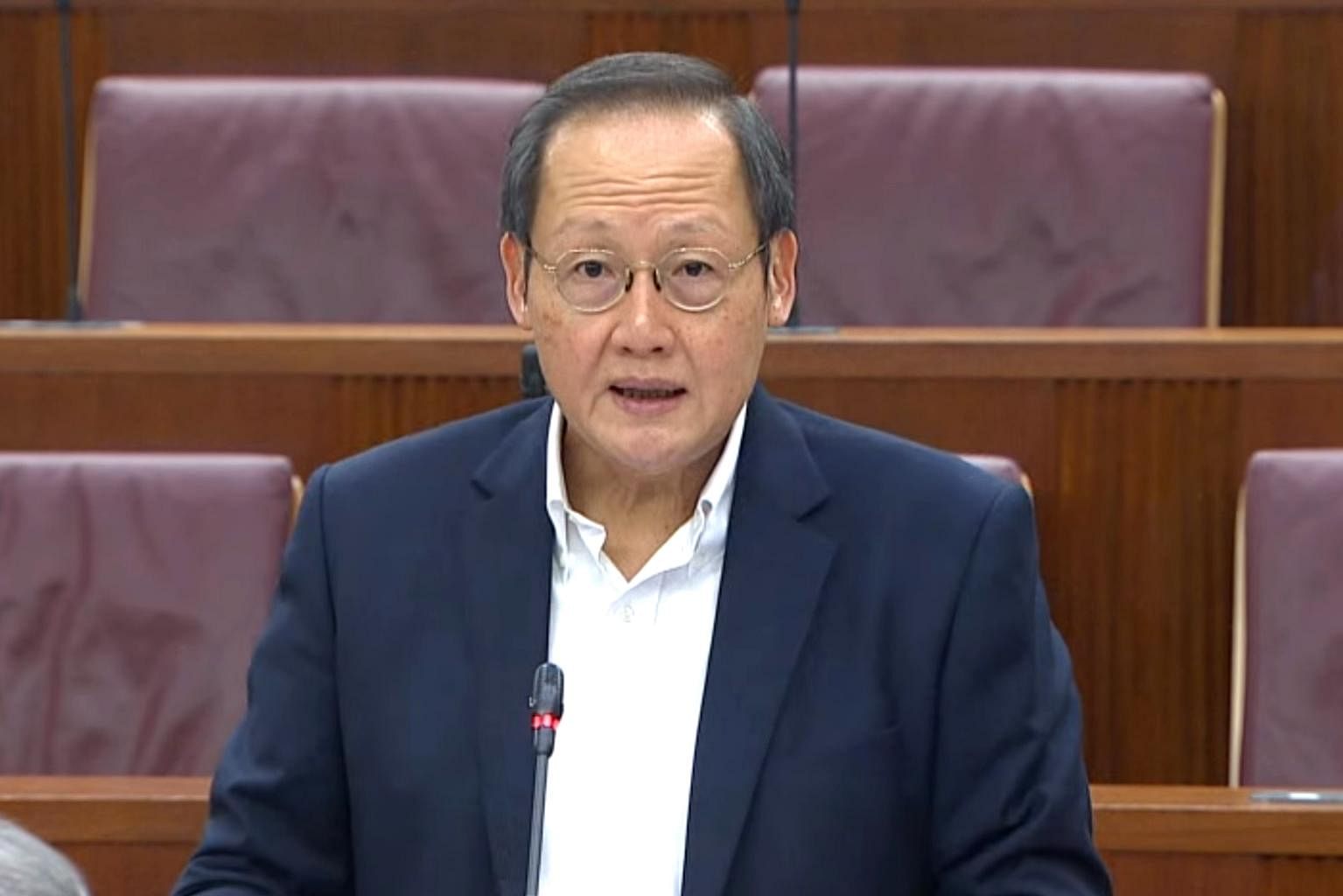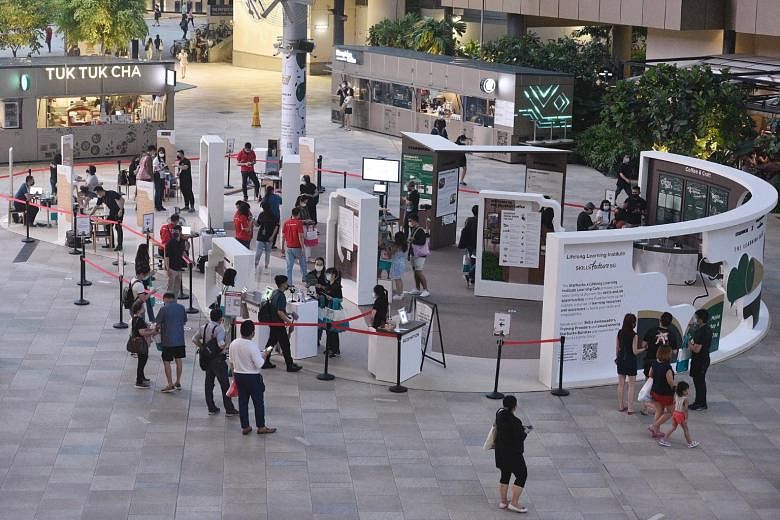SINGAPORE - More than one quarter of job vacancies here were left unfilled for six months or more, said Manpower Minister Tan See Leng on Tuesday (Oct 5), underscoring the challenges in matching jobseekers with suitable jobs as Singapore transforms its economy.
Despite efforts to retrain and upskill workers through numerous schemes, some 27 per cent of vacancies here were unfilled for six months or more, the latest available data from 2020 showed.
The ratio of job vacancies to unemployed persons reached a high of 1.63 in June 2021, said Dr Tan, noting that it represents "very very high job vacancies relative to unemployed persons".
But he said many of the openings were in the construction sector, where the shortage has been due to border measures to curb the spread of Covid-19.
With the labour market in a constant state of dynamic flux and creative tension, said Dr Tan, it would not be possible to match all job vacancies with jobseekers perfectly.
"But, if vacancies are accumulating and they are left unfilled, it also indicates that the labour market is having difficulty in accessing and finding the right talent for the vacancies," he added in response to MPs who had asked about how the Government is helping workers affected by structural changes like digital disruption.
Ms Hany Soh (Marsiling-Yew Tee GRC), Mr Yip Hon Weng (Yio Chu Kang) and Mr Liang Eng Hwa (Bukit Panjang) wanted to know just how successful career conversion and job matching efforts have been, especially those for mid-career workers in professional, managerial, executive and technical (PMET) roles.
Some 24 new SGUnited Jobs and Skills Centres have been set up in every HDB town, and human resources company Adecco has been appointed as a placement partner to help workers aged 40 and above, as well as those who have been unemployed for a long time and those with disabilities, said Dr Tan.
Close to 44,000 jobseekers found jobs through these services by Workforce Singapore (WSG) and the National Trades Union Congress (NTUC) Employment and Employability Institute (e2i).
In all, around 128,000 local jobseekers have been placed in jobs and skills opportunities as at end-July this year, with close to six in 10 placements going to mid-career PMET workers.
Dr Tan said WSG saw a large increase in placements through its career conversion programmes, which help workers retrain and switch to new jobs, with more than 14,000 locals supported.
But challenges to filling vacancies remain. For instance, some vacancies have taken longer to fill because the wage or working conditions are not attractive enough to jobseekers, said Dr Tan.
In these cases, businesses may need to redesign their work processes, job tasks and responsibilities or even review their strategy, he added.
The WSG is providing help under its Productivity Solutions Grant (PSG-JR), which was launched in December last year and provides support for companies to work with pre-approved job redesign consultants.
Some other job vacancies are persistently unfilled because the employer prefers "plug-and-play" workers who can jump right into the task.
Bur Dr Tan urged such companies to change their mindsets and to take a chance with career conversion programmes.
Employers which have adopted this approach have found that people recruited through such programmes are a good fit, he said.
About nine in 10 workers placed through these programmes remained employed after 24 months, and about seven in 10 earned more than their last-drawn salaries.
Finally, there are those vacancies that are hard to fill because of a shortage of workers with the requisite skills.
For instance, digital competencies are highly sought after by employers, but there are still many workers who do not have these skills.

Ms Yeo Wan Ling (Pasir Ris-Punggol GRC) and Mr Edward Chia (Holland-Bukit Timah GRC) asked how such workers are being retrained and reskilled.
Dr Tan said digitalisation has affected jobs to varying degrees. Many jobs now require workers to have at least some basic digital literacy skills, and most workers in this category can make the transition seamlessly, he added.
For those who need extra help, there are programmes like SME Digital Reboot by Ngee Ann Polytechnic and NTUC LearningHub, which will work with 500 SMEs to train workers in areas such as digital marketing and digital communication.
For some workers, the transition may be more complex. Workers in this category may need to implement digital technology in their jobs, by automating processes or performing more complex analysis, for instance, said Dr Tan.
This is already happening in logistics and manufacturing, and WSG has partnered with the Singapore Business Federation to launch the Industry 4.0 Human Capital Initiative to encourage companies in these sectors to trial and adopt industry 4.0 technologies early, he added. Thus far, close to 90 companies have come on board the initiative, with an additional 210 expected to do so by September 2022.
The unions and employers have also established more than 600 company training committees to drive business and workforce transformation.
There is also growing demand for deep technology skills, and this category of jobs is also where there is some of the highest demand, said Dr Tan.
IMDA's TechSkills Accelerator initiative has placed and trained more than 10,000 locals in such tech jobs since 2016, with 2,500 placed last year, added Dr Tan.
These workers have taken on jobs such as systems analysts or data scientists across sectors, including information and communications, financial services, professional services, manufacturing, and wholesale trade and retail.
The Government has also set aside close to $10 million to develop jobs transformation maps, which are detailed sectoral manpower studies that map out the impact of technology and digitalisation on individual jobs over the medium term.
These are meant to help companies and workers prepare for future jobs. So far, three such roadmaps have been launched for human resources, logistics, and financial services, and 12 more maps are in the works, said Dr Tan.
Acknowledging the challenges of workforce transformation, he said a jobs task force he set up last month will coordinate efforts across key agencies with the aim of helping local workers take up jobs with good wages and prospects in key sectors of the economy, such as financial services and infocomm technology.
"The jobs task force will work closely with tripartite partners and employers to make the labour market function even better," he added.


